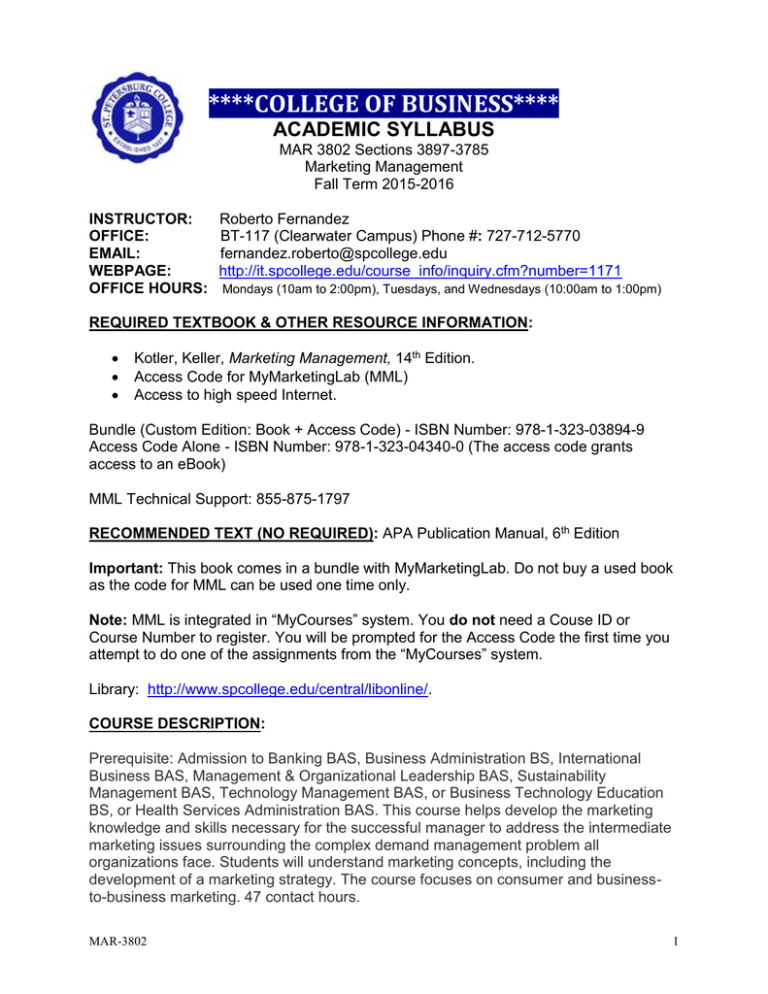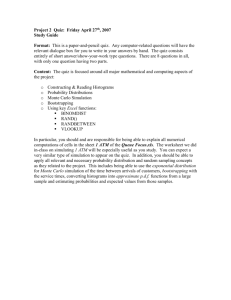CH 8
advertisement

****COLLEGE OF BUSINESS**** ACADEMIC SYLLABUS MAR 3802 Sections 3897-3785 Marketing Management Fall Term 2015-2016 INSTRUCTOR: OFFICE: EMAIL: WEBPAGE: OFFICE HOURS: Roberto Fernandez BT-117 (Clearwater Campus) Phone #: 727-712-5770 fernandez.roberto@spcollege.edu http://it.spcollege.edu/course_info/inquiry.cfm?number=1171 Mondays (10am to 2:00pm), Tuesdays, and Wednesdays (10:00am to 1:00pm) REQUIRED TEXTBOOK & OTHER RESOURCE INFORMATION: Kotler, Keller, Marketing Management, 14th Edition. Access Code for MyMarketingLab (MML) Access to high speed Internet. Bundle (Custom Edition: Book + Access Code) - ISBN Number: 978-1-323-03894-9 Access Code Alone - ISBN Number: 978-1-323-04340-0 (The access code grants access to an eBook) MML Technical Support: 855-875-1797 RECOMMENDED TEXT (NO REQUIRED): APA Publication Manual, 6th Edition Important: This book comes in a bundle with MyMarketingLab. Do not buy a used book as the code for MML can be used one time only. Note: MML is integrated in “MyCourses” system. You do not need a Couse ID or Course Number to register. You will be prompted for the Access Code the first time you attempt to do one of the assignments from the “MyCourses” system. Library: http://www.spcollege.edu/central/libonline/. COURSE DESCRIPTION: Prerequisite: Admission to Banking BAS, Business Administration BS, International Business BAS, Management & Organizational Leadership BAS, Sustainability Management BAS, Technology Management BAS, or Business Technology Education BS, or Health Services Administration BAS. This course helps develop the marketing knowledge and skills necessary for the successful manager to address the intermediate marketing issues surrounding the complex demand management problem all organizations face. Students will understand marketing concepts, including the development of a marketing strategy. The course focuses on consumer and businessto-business marketing. 47 contact hours. MAR-3802 1 MAJOR LEARNING OUTCOMES: 1. The student will explain the significance of the role of marketing in an organization as a function using a holistic marketing approach. 2. The student will examine marketing for the 21st century and the key issues surrounding an organization's demand management problem. 3. The student will explain the importance of capturing marketing insights, how those insights influence perception, preference and product development, and how they ultimately affect the buying decision process. 4. The student will describe the marketing issues, theories and approaches associated with customer salience, preference, loyalty, and retention. 5. The student will describe strategies to build, support, and promote a firm's branding initiatives on a product and company level. 6. The student will recommend methods, create, deliver, and communicate value for long-term growth. CLASS SCHEDULE: MODULE Module 1 TOPIC CH 1 Defining Marketing for the 21st Century: 1. Importance of marketing 2. Scope of marketing 3. Core marketing concepts 4. Marketing management through the years 5. Successful marketing management CH 2 Developing Marketing Strategies and Plans: 1. Marketing and consumer value 2. Corporate and division strategic planning 3. Marketing plan CH 3 Collecting Information and Forecasting Demand: 1. Marketing information system 2. Internal records 3. Marketing intelligence system 4. Macro environment developments 5. Forecast demand MAR-3802 ASSIGNMENTS DUE Module 1 – Discussion Forum Simulation CH1 Quiz CH1 Simulation CH2 Quiz CH2 Simulation CH3 Quiz CH3 Start working on your Final Project 2 MODULE Module 2 TOPIC CH 4 Conducting Marketing Research: 1. Good marketing research 2. Measuring marketing productivity 3. ROI of marketing expenditures CH 5 Creating Long-term Loyalty Relationships: 1. Customer value, satisfaction, and loyalty 2. Lifetime value of customers 3. Attract and retain customers 4. Database marketing CH 6 Analyzing Consumer Markets: 1. Consumer characteristics influence on buying behavior 2. Psychological processes influence on consumer responses 3. Purchasing decisions 4. Deliberate, rational decision process Module 3 CH 7 Analyzing Business Markets: 1. Business market vs. consumer market 2. Buying situations for organizational buyers 3. Business-to-business buying process 4. Business buyers decision making 5. Companies relationship with business customers 6. Institutional buyers and government agencies CH 8 Identifying Market Segments and Targets: 1. Market segmentation 2. Requirements for an effective segmentation 3. Target markets ASSIGNMENTS DUE Module 2 – Discussion Forum Simulation CH4 Quiz CH4 Simulation CH5 Quiz CH5 Simulation CH6 Quiz CH6 Make sure the product/service for your Final Project has been approved by your instructor. Module 3 – Discussion Forum Simulation CH7 Quiz CH7 Simulation CH8 Quiz CH8 Video Ex. CH9 Quiz CH9 CH 9 Creating Brand Equity: 1. Brand and branding 2. Brand equity 3. Brand architecture decisions in a branding strategy MAR-3802 3 MODULE Module 4 TOPIC CH 10 Branding the Brand Positioning: 1. Develop and establish an effective positioning 2. Competition 3. Brands differentiation 4. Positioning and branding in small businesses CH 11 Competitive Dynamics: 1. Market share 2. Market challengers 3. Market followers 4. Marketing strategies and the product life cycle 5. Marketers strategies and tactics for an economic downturn or recession ASSIGNMENTS DUE Module 4 – Discussion Forum Video Ex. CH10 Quiz CH10 Simulation CH11 Quiz CH11 Simulation CH12 Quiz CH12 CH 12 Setting Product Strategy: 1. Characteristics of products 2. Differentiation of products 3. Product design 4. Product mix and product lines 5. Co-brands 6. Packaging, labeling, warranties, and guarantees as marketing tools Module 5 CH 13 Designing and Managing Services: 1. Services vs. goods 2. New services realities 3. Services marketing 4. Services quality 5. Customer-support services CH 14 Developing Pricing Strategies and Programs: 1. Processing and evaluating prices 2. Initial pricing 3. Prices to meet circumstances and opportunities 4. Price change 5. Competitor’s price change reaction Module 5 – Discussion Forum Simulation CH13 Quiz CH13 Simulation CH14 Quiz CH14 Simulation CH15 Quiz CH15 CH 15 Designing and Managing Integrated Marketing Channels: 1. Marketing channel systems and value network 2. Channels performance and design 3. Managing channels 4. E-commerce and m-commerce MAR-3802 4 MODULE Module 6 TOPIC CH 16 Managing Retailing Wholesaling, and Logistics: 1. Marketing intermediaries 2. Marketing intermediaries decisions 3. Marketing intermediaries trends 4. Private label brands CH 17 Designing and Managing Integrated Marketing Communications: 1. Role of marketing communications 2. Effective communications 3. Communications mix 4. Marketing communications program ASSIGNMENTS DUE Module 6 – Discussion Forum Simulation CH16 Quiz CH16 Video Ex. CH17 Quiz CH17 Simulation CH18 Quiz CH18 CH 18 Managing Mass Communications: Advertising, Sales Promotions, Events and Experiences, and Public Relations Module 7 1. Developing an advertising program 2. Sales promotion decisions 3. Guidelines for effective brand-building events and experiences 4. Public relations and publicity CH 19 Managing Personal Communications: Direct and Interactive Marketing, Word of Mouth, and Personal Selling: 1. Direct marketing for competitive advantage 2. Effective interactive marketing 3. Word of mouth 4. Designing and managing a sales force 5. Sales people selling, negotiating and relationship marketing skills CH 20 Introducing New Market Offerings: 1. Developing new products and services 2. New product development 3. Consumer adoption of new products and services Simulation CH19 Quiz CH19 Simulation CH20 Quiz CH20 Simulation CH21 Quiz CH21 Final Project is due at the end of this week. Please submit it in “MyCourses” CH21 Tapping into Global Markets: 1. Going abroad 2. Foreign markets selection 3. Marketing in developing and developed markets 4. Country-of-origin effects 5. Managing and organizing intl’ activities MAR-3802 5 MODULE Module 8 TOPIC CH22 Managing a Holistic Marketing Organization for the Long Run: 1. 2. 3. 4. 5. ASSIGNMENTS DUE Simulation CH22 Quiz CH22 Trends in marketing practices Keys to effective internal marketing Social marketers Marketing skills Monitor and improve marketing skills IMPORTANT DATES: Course dates: 10/12/2015 – 12/09/2015 Last day to drop and receive a refund: 10/16/2015 Last day to withdraw and receive a grade of “W”: 11/13/2015 Academic calendar: http://www.spcollege.edu/calendar/ Financial Aid: http://www.spcollege.edu/getfunds/ COURSE SPECIFIC INFORMATION: Marketing is a very progressing and exciting field, responsible for researching and satisfying customer needs. This course will introduce the marketing concepts and expose students to a variety of marketing issues. Communication is key in this area of study. In this way, a structured way of thinking and processing information will be required. Students are expected to participate and interact with their peers in several Case Discussions. The learning process can be very demanding, but at the same time it will be very rewarding. The marketing field is fascinating and will help you develop a new set of skills that will open the doors to a whole new world of opportunities. ATTENDANCE: The college-wide attendance policy is included in the Syllabus Addendum at: http://www.spcollege.edu/webcentral/policies.htm Students classified as “No Show” for both of the first two weeks will be administratively withdrawn from the class. For face to face classes “No Show” means not physically present in the classroom at the moment attendance is taken. MAR-3802 6 For blended classes “No Show” means not physically present in the classroom and/or never logged into “MyCourses”. For online classes “No Show” means never logged into “MyCourses”. Students who have not completed more than 40% of their assignments due (homework & chapter exams) at the 60% point will be considered as “not actively participating” in the class and may be administratively withdrawn with a grade of “WF”. GRADING: Grades will be earned in four parts, as follows: Discussion Forums ---------------------------------------------Chapter Simulations / Video Exercises --------------------Quizzes (1 attempt, time limit) -------------------------------Final Project (Marketing Plan) -------------------------------- 20% 20% 30% 30% Total percentage ------------------------------------------------- 100.00% A B C D F 90 - 100% 80 - 89% 70 - 79% 60 – 69% Less than 60% ASSIGNMENTS: It will be the students’ responsibility to complete their assignments on time and in an acceptable manner. Students have one week to complete their assignments. For this reason, late assignments will only be accepted after properly documented extreme extenuating circumstances that justify the student not being capable of doing the assignment for a period of one week. The instructor has the discretion to extend or deny a petition for extension. There are no exemptions to this rule. Due to their nature and due dates, the Final Project and Discussion Forums cannot be extended. Please pay attention to the instructions for every assignment such as due date, time allowed (if that is the case), maximum attempts, etc. The instructions will be displayed in MML. The assignments for each module are due on Sunday at midnight before the next module starts on Monday the next day. Each module corresponds to a week of class, except for the last module (module 8) which, is a short week ending on a Wednesday at midnight EST. You will find the date each module starts and ends under their corresponding tab. All assignments are subject to the College’s “Academic Honesty Policy”. Please get familiar with it. http://www.spcollege.edu/AcademicHonesty/ MAR-3802 7 STUDENTS’ AND INSTRUCTOR’S EXPECTATIONS: Online /Student Conduct http://www.spcollege.edu/ecampus/help/conduct.htm Online Student, Faculty and Staff Expectations and Performance Targets http://www.spcollege.edu/ecampus/help/expectations.htm Academic Honesty Policy http://www.spcollege.edu/AcademicHonesty/ STUDENT SURVEY OF INSTRUCTION: The Student Survey of Instruction is administered every semester. The survey is designed to improve the quality of instruction at St. Petersburg College. All student responses are confidential and anonymous and will be used solely for the purpose of performance improvement. SYLLABUS CHANGES: Will be posted in “MyCourses” and announced to all students. SYLLABUS ADDENDUM: Please make sure you read the information in the addendum. http://www.spcollege.edu/addendum/ MAR-3802 8




